An Unsung
Soldier



Naval Institute Press
291 Wood Road
Annapolis, MD 21402
2013 by Robert S. Jordan
All rights reserved. No part of this book may be reproduced or utilized in any form or by any means, electronic or mechanical, including photocopying and recording, or by any information storage and retrieval system, without permission in writing from the publisher.
Library of Congress Cataloging-in-Publication Data
Jordan, Robert S.,
An unsung soldier : the life of Gen. Andrew J. Goodpaster / Robert S. Jordan.
1 online resource.
Includes bibliographical references and index.
Description based on print version record and CIP data provided by publisher; resource not viewed.
ISBN 978-1-61251-279-2 (ePub) 1. Goodpaster, Andrew Jackson, 19152005. 2. GeneralsUnited StatesBiography. 3. Eisenhower, Dwight D. (Dwight David), 18901969Friends and associates. 4. National securityUnited StatesDecision makingHistory20th century. 5. United States. ArmyBiography. 6. North Atlantic Treaty OrganizationBiography. 7. United StatesHistory, Military20th century. 8. United States Military AcademyBiography. 9. Cold War. I. Title. II. Title: Life of Gen. Andrew J. Goodpaster.
E745.G66
355.0092dc23
[B]
2013020592
Photos courtesy of the George C. Marshall Foundation, Lexington, Virginia.
 Print editions meet the requirements of ANSI/NISO z39.48-1992 (Permanence of Paper).
Print editions meet the requirements of ANSI/NISO z39.48-1992 (Permanence of Paper).
21 20 19 18 17 16 15 14 13 9 8 7 6 5 4 3 2 1
First printing
This book is dedicated to the memories of
Dr. Norman H. Gibbs
Chichele Professor of the History of War, All Souls College, Oxford University
and
Dr. Edgar S. Furniss Jr.
Professor of Politics, Princeton University; Director, The Mershon Program,
The Ohio State University
Mentors to many students and scholarsespecially to a young student who
found himself in awesomely unfamiliar academic environments
Contents
I am happy to have this opportunity to say a word about my dear friend and sometime colleague, Gen. Andrew Goodpaster. I do this having in mind that I was honored with the Goodpaster Award of the George C. Marshall Foundation. In addition, I was invited to dedicate Goodpaster Hall on the campus of St. Marys College, in nearby Maryland.
I first met General Goodpaster when he became commandant of the National War Collegethe militarys highest institution of professional military educationand I became a student there shortly thereafter. General Goodpaster took me under his wing and provided me with invaluable perspectives on leadership, policy and strategy development, and war prevention. While I confess to receiving somewhat special treatment, General Goodpaster so endeared himself to my entire class that they elected him an honorary member of the class at the end of the year. That was an initiation of an increasingly close association, which grew until his unfortunate passing in 2005.
There never is a poor time for a career military person to bring up the subject of leadership. In 1981, when General Goodpaster was superintendent at West Point, he described his concept of leadership: I thought that the framework [for the Department of Behavioral Sciences and Leadership] had to be leadership, but a deep and broad understanding of leadership. I think that has been the case. And the related disciplinespsychology, for example, and some elements of sociologywould fall within the framework of a sense of how you should give leadership. How does an officer give leadership at the various echelons of responsibility?
This observation had been earlier reframed thus: If we wish to know the meaning of behavior, we must know the meanings of the behaver [sic]; to remain outside his frame of experience is simply to remain in the dark.
With warfare today relying more and more on high technology, it is noteworthy that General Goodpasters Princeton doctoral dissertation, written in 1950, anticipated this significant trend before it had become such a dominant aspect of both strategy and tactics. For him, knowledge of engineering (he was commissioned in the Corps of Engineers from West Point) had to be linked to, or partnered with, knowledge of the social and behavioral sciences. He also was convinced that, as the United States had entered the world political-military arena to stay after the great victory of World War II, military officers should obtain a thorough grounding in history and international affairs. I watched him put his ideas into practice when we were both at the National War College.
General Goodpasters leadership style was understated and quietly focusedhe led by persuasion, by rational discourse, and by unfailing courtesy and consideration for others. These traits made him both a successful Supreme Allied Commander in NATO and an essential White House assistant and confidante to President Dwight D. Eisenhower.
In a completely different vein, General Goodpaster joined the board of St. Marys College of Maryland in 1987. He devoted twelve years to a substantial overhaul of the colleges overall progress, curriculum procedures, and faculty compensation to lift St. Marys to the first tier of liberal arts colleges in the nation.
Policy was as much a part of him as command and combat; in the Army an officer who was outstanding in both was a marked man. This is why Goodpaster rose quickly through the ranks, always being called back into a policy role even as he desired command assignments. He invariably wanted to know why, as well as what and how, when confronted with a policy dilemma. Also, he shared President Eisenhowers insistence on considering the various alternatives when arriving at a decision. Not only was he not a yes-man, he did not want to be associated with them as he advanced up the career ladder.
Professor Jordan has written a painstakingly researched, yet eminently readable, account of the career and accomplishments of General Goodpaster, for which I, for one, am very grateful.
Lt. Gen. Brent Scowcroft, USAF (Ret.)
National Security Advisor to President Gerald Ford and
President G. H. W. Bush
It is absurd to make out that the means ever became more important than the end.
Next page

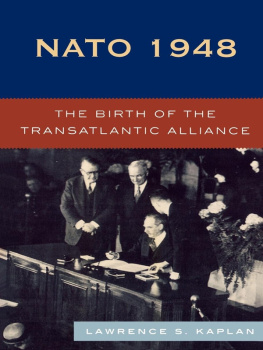
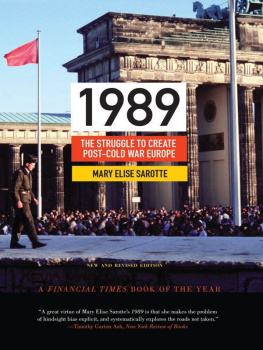
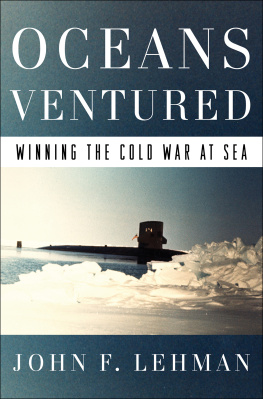

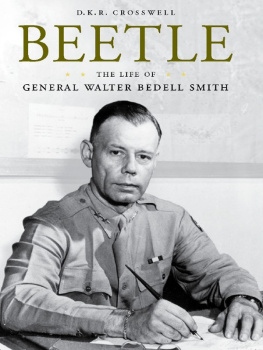
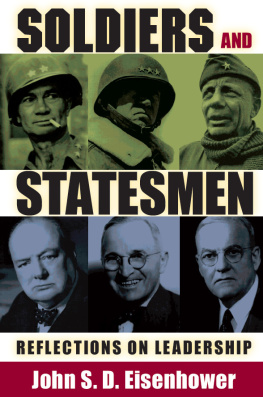


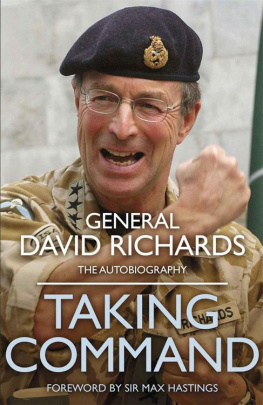



 Print editions meet the requirements of ANSI/NISO z39.48-1992 (Permanence of Paper).
Print editions meet the requirements of ANSI/NISO z39.48-1992 (Permanence of Paper).